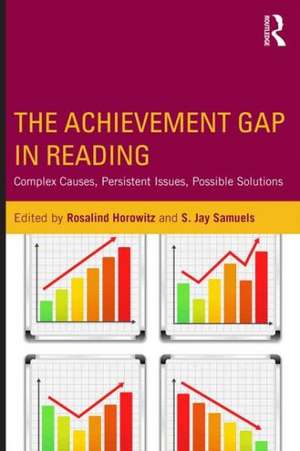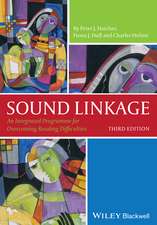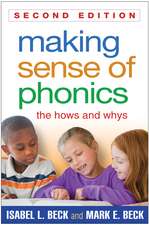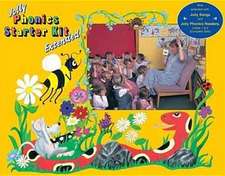The Achievement Gap in Reading: Complex Causes, Persistent Issues, Possible Solutions
Editat de Rosalind Horowitz, S. Jay Samuelsen Limba Engleză Paperback – 7 apr 2017
Bringing valuable theoretical frameworks and in-depth analytical approaches to interpretation of data, the contributors examine factors that contribute to student achievement inside the school but which are also heavily influenced by out-of-school factors—such as poverty and economics, ethnicity and culture, family and community stratifications, and approaches to measurement of achievement. These out-of-school factors present possibilities for new policies and practice. The overarching theme is that achievement gaps in reading are complex and that multiple perspectives are necessary to address the problem. The breadth and depth of perspectives and content in this volume and its conceptualization of the achievement gap are a significant contribution to the field.
| Toate formatele și edițiile | Preț | Express |
|---|---|---|
| Paperback (1) | 384.59 lei 6-8 săpt. | |
| Taylor & Francis – 7 apr 2017 | 384.59 lei 6-8 săpt. | |
| Hardback (1) | 876.36 lei 6-8 săpt. | |
| Taylor & Francis – 13 apr 2017 | 876.36 lei 6-8 săpt. |
Preț: 384.59 lei
Nou
Puncte Express: 577
Preț estimativ în valută:
73.60€ • 76.56$ • 60.76£
73.60€ • 76.56$ • 60.76£
Carte tipărită la comandă
Livrare economică 14-28 aprilie
Preluare comenzi: 021 569.72.76
Specificații
ISBN-13: 9781138018792
ISBN-10: 1138018791
Pagini: 254
Ilustrații: 4
Dimensiuni: 152 x 229 x 22 mm
Greutate: 0.34 kg
Ediția:1
Editura: Taylor & Francis
Colecția Routledge
Locul publicării:Oxford, United Kingdom
ISBN-10: 1138018791
Pagini: 254
Ilustrații: 4
Dimensiuni: 152 x 229 x 22 mm
Greutate: 0.34 kg
Ediția:1
Editura: Taylor & Francis
Colecția Routledge
Locul publicării:Oxford, United Kingdom
Public țintă
PostgraduateCuprins
Preface
Acknowledgments
Chapter 1. The Achievement Gap in Reading: Unique Historical and Future Perspectives
Rosalind Horowitz and S. Jay Samuels
Part I. Cases of Specific Demographics and Economics
Chapter 2. Poverty’s Powerful Effects on Reading Achievement and the Achievement Gap
David Berliner
Chapter 3. Creating Responsive Teachers of Hispanic and Bilingual Students Learning English
Robert Jiménez, Sam David, Mark Pacheco, Victoria J. Risko, Lisa Pray, Keenan Fagan, and Mark Gonzales
Chapter 4. Motivating and Instructing African American Students in Classrooms
John T. Guthrie and Angela McRae
Chapter 5. Closing the Reading Achievement Gap for Indigenous Children
Jay S. Blanchard and Kim Atwill
Part II. Conceptualizing and Measuring the Achievement Gaps in Reading
Chapter 6. Why the Achievement Gap?
Edmund W. Gordon and Paola C. Heincke
Chapter 7. Including Differences in Variability in Assessing the Achievement Gap in Reading
Michael Harwell
Chapter 8. International Brain Wars: Adolescent Reading Proficiency, Performance, and Achievement from a Competitive Global Perspective
Rosalind Horowitz
Part III. Explaining and Reducing the Achievement Gaps in Reading
Chapter 9. The Talk Gap
Terrance D. Paul and Jill Gilkerson
Chapter 10. Summer Reading Loss is the Basis of Almost all the Rich-Poor Reading Gap
Richard L. Allington and Anne McGill-Franzen
Part IV. Contradictory Efforts and Commonalities in Attempts to Close the Gaps in Reading Achievement
Chapter 11. The Federal Effort: How Five Different and Sometimes Contradictory Efforts have been made to Close the Achievement Gap
Richard Long and Alan Farstrup
Chapter 12. Synthesis, Discussion, and Recommendations: What We Can Do to Advance Reading Achievement
Rosalind Horowitz and S. Jay Samuels
List of Contributors
Author Index
Subject Index
Acknowledgments
Chapter 1. The Achievement Gap in Reading: Unique Historical and Future Perspectives
Rosalind Horowitz and S. Jay Samuels
Part I. Cases of Specific Demographics and Economics
Chapter 2. Poverty’s Powerful Effects on Reading Achievement and the Achievement Gap
David Berliner
Chapter 3. Creating Responsive Teachers of Hispanic and Bilingual Students Learning English
Robert Jiménez, Sam David, Mark Pacheco, Victoria J. Risko, Lisa Pray, Keenan Fagan, and Mark Gonzales
Chapter 4. Motivating and Instructing African American Students in Classrooms
John T. Guthrie and Angela McRae
Chapter 5. Closing the Reading Achievement Gap for Indigenous Children
Jay S. Blanchard and Kim Atwill
Part II. Conceptualizing and Measuring the Achievement Gaps in Reading
Chapter 6. Why the Achievement Gap?
Edmund W. Gordon and Paola C. Heincke
Chapter 7. Including Differences in Variability in Assessing the Achievement Gap in Reading
Michael Harwell
Chapter 8. International Brain Wars: Adolescent Reading Proficiency, Performance, and Achievement from a Competitive Global Perspective
Rosalind Horowitz
Part III. Explaining and Reducing the Achievement Gaps in Reading
Chapter 9. The Talk Gap
Terrance D. Paul and Jill Gilkerson
Chapter 10. Summer Reading Loss is the Basis of Almost all the Rich-Poor Reading Gap
Richard L. Allington and Anne McGill-Franzen
Part IV. Contradictory Efforts and Commonalities in Attempts to Close the Gaps in Reading Achievement
Chapter 11. The Federal Effort: How Five Different and Sometimes Contradictory Efforts have been made to Close the Achievement Gap
Richard Long and Alan Farstrup
Chapter 12. Synthesis, Discussion, and Recommendations: What We Can Do to Advance Reading Achievement
Rosalind Horowitz and S. Jay Samuels
List of Contributors
Author Index
Subject Index
Notă biografică
Rosalind Horowitz is Professor, Discourse and Literacy Studies, Departments of Interdisciplinary Learning and Teaching and Educational Psychology, College of Education and Human Development, The University of Texas—San Antonio, USA.
S. Jay Samuels is Professor Emeritus, Department of Educational Psychology, College of Education and Human Development, The University of Minnesota—Twin Cities, USA.
S. Jay Samuels is Professor Emeritus, Department of Educational Psychology, College of Education and Human Development, The University of Minnesota—Twin Cities, USA.
Descriere
In this volume, prominent scholars address educational and reading research from varied perspectives and discuss what it will take to close the achievement gap. Making a significant contribution to the field, the achievement gap is redefined as a level at which all groups can compete economically in our society and have the literacy tools and habits needed for a good life.





